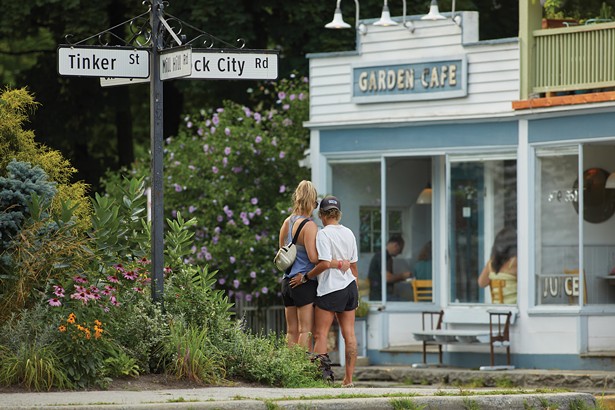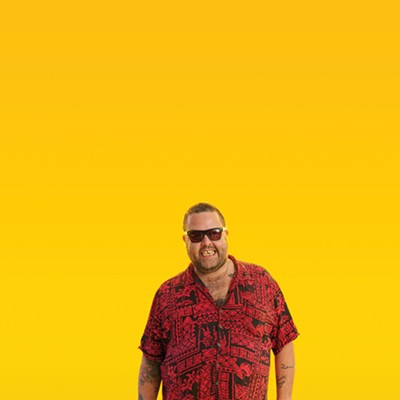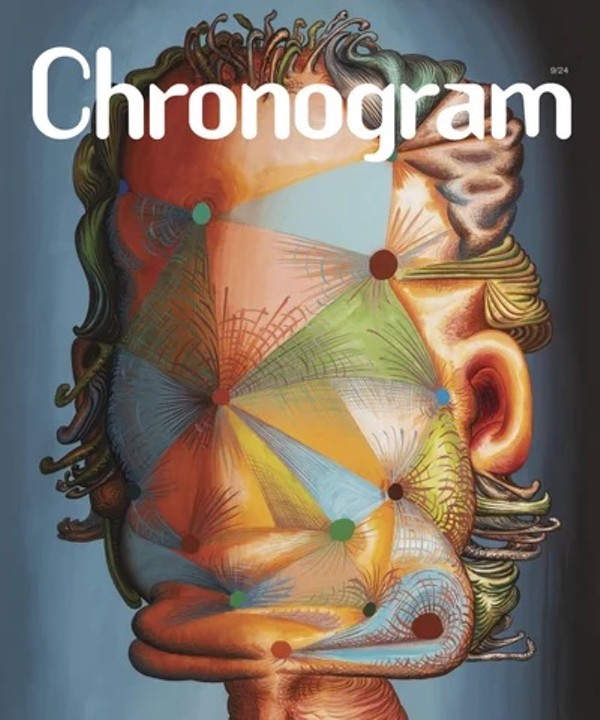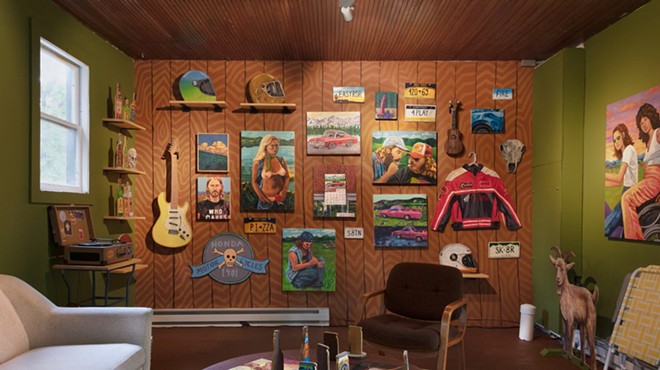In 1970, a steady stream of pilgrims with little more than the clothes on their backs kept arriving in this town 60 miles northeast of the festival site, wondering where the party was, straining the patience of some in what was, in its own right, already a cultural mecca of sorts. "The town was inundated with young people looking for Bob Dylan and the Woodstock Nation," remembers Michael Berg, executive director of the social services organization Family of Woodstock. "It was pretty strange, actually. It went on for several years."
Some places would have responded with handcuffs. Not Woodstock, which has been hosting artists since the earliest days of the 20th century. "There was a very conservative element, but there were a lot of people who were all about peace and love, energetic, and committed to greeting people differently," says Berg, who was 25 at the time and had moved from New York City to help his sculptor brother found a factory. "We didn't want a police response."
Local resident Gail Varsi put her own peace on the line during a town meeting. "She said, 'If there's a problem in town, just call me—679-2485,'" Berg recalls. "When she had to go out, she'd call a friend to come over and cover the phone." Thus was born what, as far as anyone can tell, is the oldest existing emergency hotline in the United States. To this day, one can call that number 24 hours a day and reach a friendly voice eager to help solve whatever the problem might be.
What happened next was cobbled together from good will and the art of the possible, but the guiding philosophy is as unchanged as the phone number. "We decided we wanted to create a safe space where people could find help, so we talked about what that would look like," Berg recalls. "We adopted three principles: greet everyone with respect, don't tell them what to do, and don't burden them with our judgment. Services were rudimentary. We were taking people into our homes. Then in 1973, the government stepped in and told us that was illegal. We called the churches, we called everyone we could think of—we had no resources, but we knew we were going to help those people." That shared impulse would become Family of Woodstock, offering a comprehensive array of services to thousands of people a year.
Social Sculpture
Fifty-five years later, the question still arises: "What visitors want to know—well, some of them still want directions to the festival site," says Rachel Marco-Havens, whose father, Richie Havens, kicked off that famous gathering with a soul-tingling rendition of "Freedom." "But then they want to know, where do I find the arts, the creatives? Where's the music?," she says.
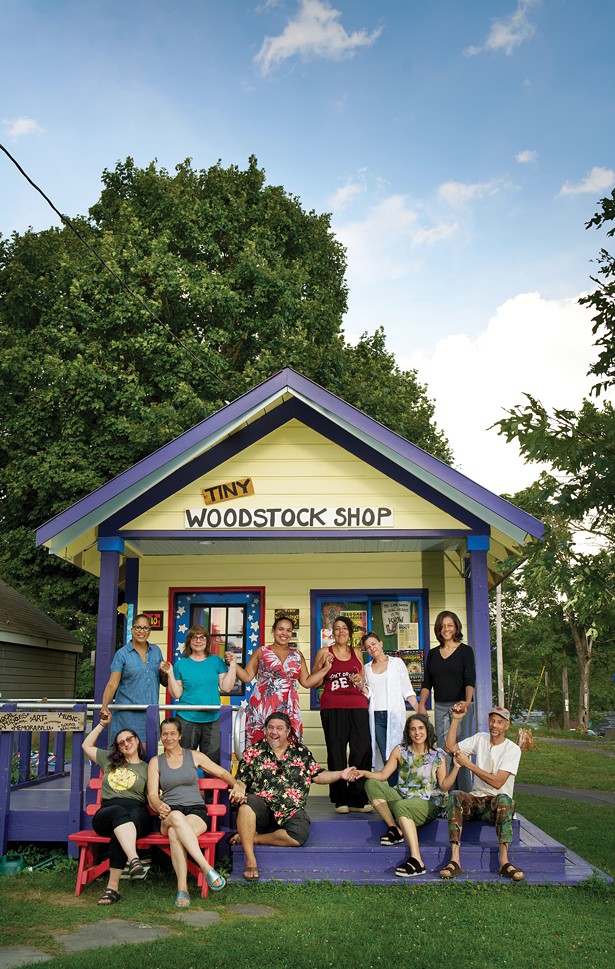
It's no accident that Marco-Havens is fielding these questions; she and lifelong friend Shala Lang-Moll, daughter of festival creator Michael Lang, are copresidents of the re-envisioned Woodstock Chamber of Commerce and Arts. And it's not as though she doesn't have answers to offer. There were answers even before 1969, with the Byrdcliffe Colony and Maverick Arts Colony—scandalous in their own right at the beginning—already over half a century old.
"So the festival was the center point of a 110-year arc for this arts colony we live in," says Marco-Havens. "I love this town; I was born here three days after the festival and raised here by incredible women, and I'm sorry to say it, but this town is becoming a shell of itself." Looking for space to host a collective arts shop, Marco-Havens and Lang-Moll were provided a building and asked to take the Chamber's reins; they're striving to build an organization that will work for all.

With a median home listing price of $750,000 and retail space leasing for $32 a square foot, Woodstock is not a place where young strugglers find an easy foothold. Musician Paul McMahon, founder of the Woodstock Mothership, which he likes to describe as a "spiritual social sculpture in progress," says iconic poet/comic Mikhail Horowitz came up with "Welcome to Woodstock: Old Age Home for the New Age" in the late 1990s. Regardless, there are still plenty of people trying to keep the vibe strong, reaching back—as Marco-Havens does—to the still-electric current of Eastern, indigenous, and psychedelic spiritual traditions that sparked the hippie movement before the festival was ever imagined.
In Jogger John's Footsteps
The Woodstock Mothership is one of several locations that will be hosting the town's second annual Awakening Festival from August 7-9; organizers Sam Truitt and Michael Raphael of the Center for Awakening hope to offer something open-hearted and accessible. Poet and artist (and longtime Chronogram contributor) Sparrow will occupy the Village Green for the bulk of the weekend, "holding the anchor," Truitt says, to welcome festival guests and offer information as needed, although the idea of having him stay there for 72 straight hours has proven impractical.Plans include ceremonies, workshops, talks, and readings; there will be dawn and dusk meditation sessions and a gathering at the Bearsville Theater compound on Saturday, with a healing garden market, Thich Nhat Hanh-inspired "walking meditations," awareness activities for kids, and six hours of music, followed by a Books and Poetry Garden Party at Shivastan Poetry Ashram, next door to the Mothership.
The festival will welcome some big names such as Tibet House cofounder Robert Thurman and musician Krishna Das, but its core inspiration is local legend "Jogger John" Synan, famed for tidying the town's streets and for his warmhearted, unconventional wisdom, who died in 2022. "He was carrying the moral and aspirational jewels of the community, and his passing left a big void," says Truitt. "We aspire to fill that void and expand it with pan-spiritual celebrations, serving the community and making awareness techniques more accessible to those who might not have $30 to drop on a yoga class."
Change of Direction
Over at the Bearsville Theater, reimagined since the pandemic by owner Lizzie Van and managed by Bowery Ballroom veteran Frank Bango, musicians enjoy a state-of-the-art experience designed with their comfort in mind, true to the original vision of originator and legendary producer Albert Grossman. "There's a particular flavor associated with Woodstock and we're happy to support that, but we want it to be a place where younger musicians can come and help define their futures and the future of music," says Bango. "There's a whole world of working-class players; we want to give them all the tools, the world-class sound and lighting, to perform at their absolute best." Recent shows that indicate a change of artistic direction include performances by Billy Bragg, the Mountain Goats, and a comedy showcase featuring Chris Gethard and Eddie Pepitone.
Melissa Gibson grew up snowboarding at Belleayre Mountain and moved north from Long Island with her family in 2010. "This area is exactly what we wanted: natural resources, splendid people, and business opportunities," she says. "As an entrepreneur I've always focused on localism and sustainability." In 2014, when Graves' Disease showed up alongside her preexisting Lyme, celiac, and menopausal concerns, she turned to CBD and resolved all of it.
In 2016, she founded Hemp & Humanity and since then has been educating and advocating for cannabis. In 2020, she opened a brick-and-mortar outpost at 17 Tinker Street, stocking hemp products from over 40 women-owned makers. "We wanted to offer the chance for smaller businesses to get their products in front of the tourist market here," she says. "Everything is highly curated. I've worked with thousands of folks to help them find the right formula and protocol for their needs, operating in the space between medical and adult-use recreational, and we've become the go-to resource for people wanting to learn about the plant."
In June, she received the news that the state had licensed her to open Woodstock's first adult-use dispensary—and then found out that town supervisor Bill McKenna had an issue with that happening at her Tinker Street location, which is within 200 feet of a church. "Our current location meets every New York State requirement, but we've agreed to work with the town and find a solution that satisfies everyone," she says. "We'll honor the spirit of the town and lift up other local businesses and artists, at the very least, we'll create an appetite for local munchies."
Town Supervisor Bill McKenna says he welcomes Gibson's endeavors but had thought that state regulations covered proximity to a house of worship, and says he's working with her to help adjust her state license to a new location that should satisfy everyone. (The Woodstock Reformed Church is neutral on the matter.)

Meanwhile, McKenna's wrestling with the ongoing issue of housing affordability. "We need places for our artists and young people, for servers and caregivers, to live," he says. "We're working on zoning amendments, on a possible tax on home sales over the median cost, and on facilitating the creation of accessory-dwelling units."
He's proud of having worked with housing nonprofit RUPCO to create an affordable complex that opened in 2013 and now serves as a model of what can be done, despite much local opposition at the time. "One year of my support of that project cost me an election. Two years later I was re-elected and helped see it through," he says. "This is a town full of smart people with strong opinions, and that always leads to spirited discussion."
Double Rainbow
At the 104-year-old Woodstock Artists Association and Museum, executive director Nicole Goldberg works to extend the nonprofit's commitment to underserved communities; opening its galleries and services to reach a 50-mile radius and partnering with Mi'kmaq descendant and professor Evan Pritchard for a 2022 exhibit, "Restoring Indigenous Voices: Landscapes from the Permanent Collection," which juxtaposed landscapes with narratives explaining the indigenous history of each location. "It was eye-opening and mesmerizing," she says. "I think we're developing a balanced institution here, and that's crucial. This is an arts town, and I don't think that will ever change."
Woodstock's first officially sanctioned Pride march happened on June 9, with several hundred people participating. As the parade was about to step off, the library—which had hosted a successful drag queen story hour the day before—received an emailed bomb threat with the subject line "We will kill you." Marchers waited under cloudy skies as the police swept the building and found nothing, then set off from the Comeau property.
"Just as we turned the corner onto Tinker Street, the sun came out," recalls co-organizer Meghan Ghiroli, "as if the heavens were with us, and we were greeted by a sea of faces cheering us on. The energy, the joy—it was unforgettable."

Later that day, as thousands of folks—including honorees with memories of the original Stonewall Riot—mingled at an exuberant afterparty at Colony, a vivid double rainbow graced the skies.
"None of us are trying to get up on a pedestal," says Marco-Havens. "We just want Black and brown people to feel safer. We want artists and creatives to know they have a place in this community and a voice. Well, they do now—the Chamber's here, and we're organized to advocate."
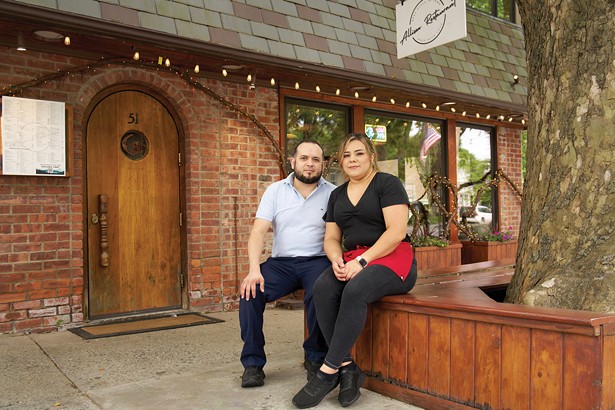
"Somebody told me indigenous folks saw this as a place to come do rituals, not a place to live," says McMahon. "The thinking, supposedly, was that people who actually lived here would go crazy. The jury may still be out on that."








